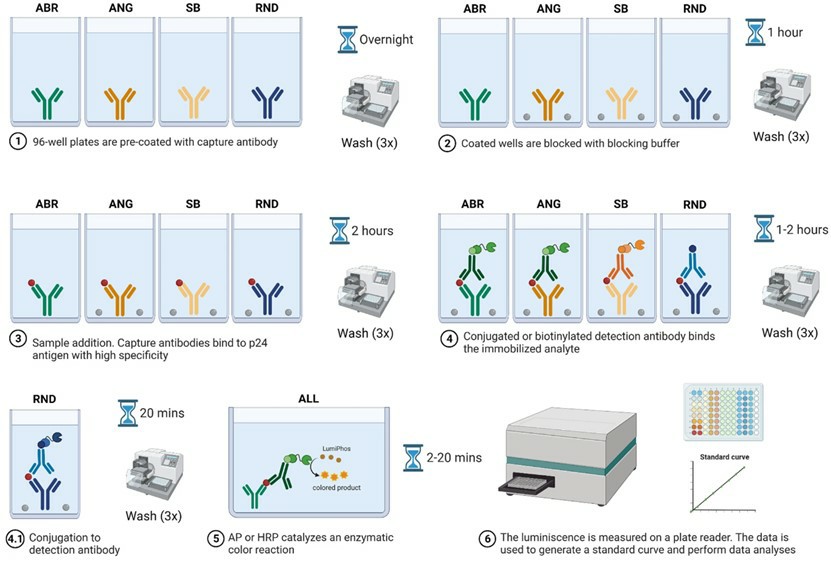ELISA for Glyco-code Based Diagnostics
Creative Biolabs is professional in offering high-quality glyco-code based diagnostics services. We provide the most suitable testing method according to the different goals and expected applications.
Background of enzyme linked immunosorbent assay (ELISA)
There is increasing evidence that abnormal glycosylation is related to cancer progression. Therefore, glycol-code analysis has gradually become a promising strategy in cancer diagnosis and prognosis. Great efforts have been made to identify specific tumor-related glycosylation changes and methods have been widely established to identify and quantify glycosylation changes in complex biological samples. Although most of the methods can provide detailed information on the structure of glycans, they are not suitable for analyzing large numbers of biological samples. Therefore, some improved methods are needed to quantify the glycosylation changes of proteins in the original serum.
Introduction of ELISA
ELISA is a plate-based assay technology, mainly used to detect and quantify peptides, proteins, antibodies, and hormones. Since the sensitivity of the enzyme label can be detected by the reaction of the enzyme label with the appropriate substrate, the sensitivity of the ELISA is hundreds of times higher than that of the precipitation test. In addition, ELISA is a heterogeneous immunoassay, it involves steps that can separate reactive and non-reactive components. The reaction process is carried out on the solid phase, and the components appear in sequence and bind to the solid phase. After each step, irrelevant unreacted and possible inhibitory components will be washed away.
Types of ELISA in Glyco-Code Based Diagnostics
-
Conventional direct ELISA
The traditional direct ELISA is well established and it is currently one of the most widely used methods in glycol-code analysis. Traditional direct ELISA can evaluate a limited number of glycan-protein interactions. In the traditional direct ELISA, glycans are located on a flat surface and physically adsorbed to polystyrene in a multivalent form as a combination with polyacrylamide or albumin carriers. But ELISA is usually associated with the study of a limited set of glycans.
Recently, a new lectin-based lectin-ELISA assay has been developed. This method is mainly used to analyze the glycosylation changes of proteins in serum samples. Lectin is considered to be a promising tool for glycomics and glycoproteomics research due to its wide availability, affinity, and relative specificity. Lectin can be used alone or in combination with other methods. Lectin-based methods such as lectin blot and lectin-ELISA assay have been applied to capture specific glycans of glycoproteins to enhance the understanding of abnormal glycosylation and carcinogenesis. In addition, the analysis of glycoproteins based on the ELISA assay of in-plate lectins has been successfully developed.
 Fig.1 ELISA protocol for detecting HIV infection.1
Fig.1 ELISA protocol for detecting HIV infection.1
-
Reverse lectin-based ELISA assay
To identify potential diagnostic candidate markers, a new method-reverse lectin-based ELISA assay is gradually developed. This method is used to analyze the glycosylation changes of glycoproteins in crude serum samples, mainly by using lectin-based glycoprotein capture followed by biotin-conjugated antibodies for detection. And this lectin-based reverse ELISA assay has been successfully applied to patients with ovarian cancer and some changes in glycosylated proteins have been observed. Specific glycosylation changes of proteins in reverse lectin-based ELISA assay provide an alternative method for quantifying the glycosylation changes of proteins in serum samples.
Advantages
-
High sensitivity
-
High efficiency-results can be available in a few hours
-
Simplicity of basic equipment
-
Quantitative precision and reproducibility
-
Low cost and long shelf life of reagents
In terms of rich experience and advanced technical platforms, Creative Biolabs is now offering a variety of glyco-code detection services to assist your valuable projects. Please contact us for more details.
Reference
-
Molina, Mariano A., et al. "In-house ELISA protocols for capsid p24 detection of diverse HIV isolates." Virology journal 20.1 (2023): 269. Distributed under Open Access license CC BY 4.0, without modification.
For Research Use Only.
Related Services

 Fig.1 ELISA protocol for detecting HIV infection.1
Fig.1 ELISA protocol for detecting HIV infection.1
